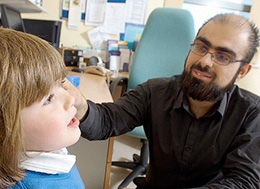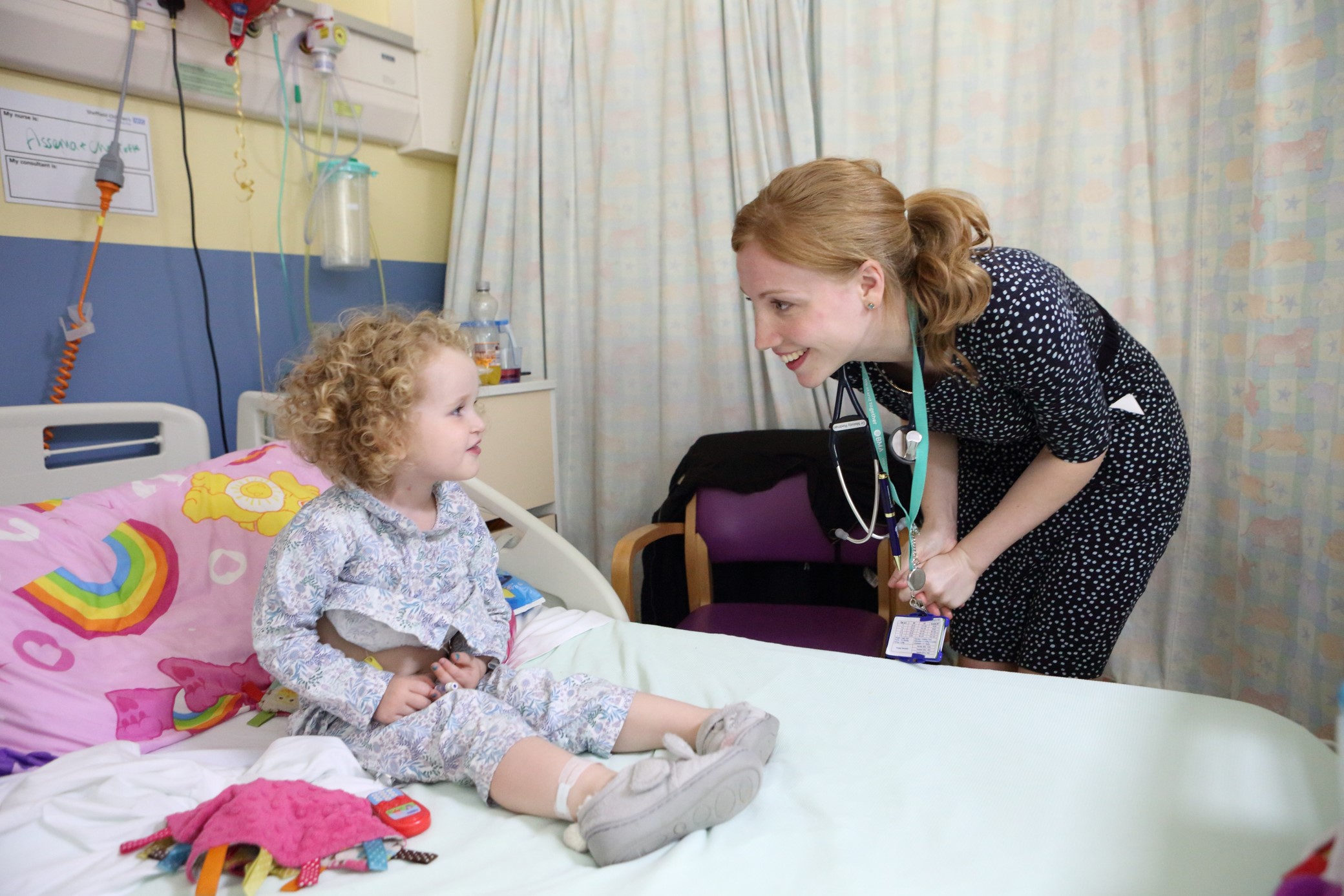Research.
 The Yorkshire and Humber School of Paediatrics is committed to supporting and increasing paediatric research opportunities in child health. We recognise that encouraging research leads to better doctors and better care for the children we treat. This section gives an overview of research in the Yorkshire and Humber School of Paediatrics and the opportunities available for our trainees.
The Yorkshire and Humber School of Paediatrics is committed to supporting and increasing paediatric research opportunities in child health. We recognise that encouraging research leads to better doctors and better care for the children we treat. This section gives an overview of research in the Yorkshire and Humber School of Paediatrics and the opportunities available for our trainees.
How can I become involved in research?
Regardless of experience all trainees have the opportunity to become involved in research during their training in Yorkshire. Many of our hospitals are involved in running clinical trials and trainees are able to recruit and consent patients.
It may be possible for trainees to conduct their own research project depending on the time and resources involved. The Research and Development department at your local hospital will be able to give further information.
Good Clinical Practice (GCP) is an international ethical and scientific quality standard for designing, conducting, recording and reporting trials that involve the participation of human subjects. In order to take part in research it is essential to have a certificate in Good Clinical Practice (GCP). This is either a one day course or can be studied as an elearning package which takes around half a day. It is not possible to recruit or consent for trials without this certificate.
Health Education Yorkshire and the Humber encourages all its trainees to obtain this certificate as early on in their training as possible. It is possible to take study leave in order to attend this course and any course fees should also be covered.
View more information about how to obtain a GCP certificate click here
The Yorkshire School of Paediatrics, whilst encouraging all trainees to become involved in research and teaching, has a number of specific opportunities for those committed to research.
Academic Clinical Fellowships
Paediatricians who wish to pursue an academic career have particular training needs. HEYH has recognised this through the creation of a number of academic clinical fellow (ACF) posts in paediatrics which are currently applied for in ST1. These jobs combine clinical experience with protected research time. It is anticipated that after completion of the post the majority of ACFs will go on to complete a higher degree.
At present there are 2 ACFs in East Yorkshire and one in South Yorkshire. Further information about these jobs, the person specification and how to apply can be found on the academic section.
Academic Clinical Lectureships
If you are currently in specialty training and have recently obtained a PhD or equivalent you may be eligible to apply for a clinical lectureship. These are University appointments and are advertised throughout the year. More information can be found on the academic section.
Bassetlaw Clinical Fellows
Based in Sheffield Children’s Hospital, these posts usually run for 2 years and allow paediatric ST4 trainees and above to have a dedicated period of research outside their clinical training. They are funded jointly by the University of Sheffield and Doncaster and Bassetlaw Hospitals NHS Foundation Trust.
Successful applicants spend 1x24 hour shift per week undertaking clinical duties at Bassetlaw Hospital and the rest of their time working on a research project of their choosing. They also have teaching commitments at the University of Sheffield. In the majority of cases the fellow’s research will be written up for a higher degree such as an MD or PhD.
There is funding available for three trainees at any one time and posts are advertised every one to two years by the University of Sheffield. Further information is available from Professor Nick Bishop.



Clinical Academic Training at Sheffield
Academic Clinical Fellowships in Paediatrics
Academic opportunities
The UK’s first dedicated paediatric clinical research facility was opened at Sheffield Children’s Hospital in January 2008. The CCRF (Children’s Clinical Research Facility) provides all the facilities needed to undertake first class research in children and the Trust’s R&D staff are embedded within the CCRF, making it a “one-stop shop” for supporting investigators. The CCRF can accommodate a range of studies, from experimental medicine to phase IV clinical trials. Translational research opportunities are widely supported by PIs interlinking clinical research with laboratory research based in the Medical School, the Bateson Centre and Biomedical Sciences.
Current key research areas include: bone metabolism & disease, endocrinology, growth & diabetes, radiology, neonatal screening, haematology, respiratory disease, gastroenterology, inflammatory cell biology and cystic fibrosis.
|
“I was able to help design my own project with leading researchers in Sheffield. I made links with other institutions including abroad. I know my research will make a difference to the lives of my patients.” Fawaz Arshad, Paediatrics ACFST3 |


|
Melody Redman, Paediatrics ACFST2 at Sheffield Children’s Hospital. Photograph courtesy of the BMA. |
 Post specifics
Post specifics
There is flexibility as to when you take up your 9 month research time, including being able to work part clinical and part academic. Your project can be basic science, working in world leading labs, face to face with patients or desk based analyzing large data sets.
As part of the ACF you can take modules from the University of Sheffield to help aid your development. Not only do you get the support of your supervisor, but with a mentoring scheme, Clinical Academic Society and your academic peers, you’ll be well looked after in Sheffield.
Previous award holders have successfully worked Bone, Endocrinology, Oncology, and Respiratory.
Clinical training offered
The clinical training involves posts in general paediatrics as well as several specialties. Rotations in NICU in the Jessop Wing offer essential experience in neonates and opportunities to develop clinical skills. Regional and local training sessions provide excellent learning opportunities and the trainees are well supported through their MRCPCH exams.
Contact details
Fawaz Arshad (ACFST3) – f.arshad@sheffield.ac.uk
Melody Redman (ACFST2) - m.redman@sheffield.ac.uk
Chrysa Rizava (ACFST1) – c.rizava@sheffield.ac.uk
Nils Krone (Academic Lead) - n.krone@sheffield.ac.uk
For more info - http://bit.ly/2jfqUaw
Candlelighters Clinical Research Fellowships
These are Leeds-based fellowships for trainees in paediatrics and related disciplines to undertake a period of out of programme research in a topic related to childhood cancer. Fellows are employed by the University of Leeds, although maintain an honorary contract with Leeds Teaching Hospitals NHS trust. The majority of time is spent undertaking research towards a PhD or MD, but fellows usually attend a weekly clinic and also work some weekends on the paediatic haematology/oncology wards. There are currently six Candlelighters Fellows and posts are advertised annually. Further information and a list of available projects is available from Paul Affleck P.A.Affleck@leeds.ac.uk
publications: https://medhealth.leeds.ac.uk/profile/900/1876/amanda_friend/publications
Melody Redman
ACF Paediatrics Specialty Trainee Year 2
Yesterday I was working on the neonatal intensive care unit – a very practical job where often we act fast and see rapid results. Today, I wake up knowing my tools will not be incubators, ventilators or a stethoscope, but rather online literature resources, referencing software, and a word processor. The one tool in common: my inquisitive mind. As a clinical academic trainee, today is different. A different type of busy-ness. I have meetings and tasks listed in my planner: meet with an advisor at the NIHR Research Design Service, continue my literature review, edit an application for a grant for patient and public involvement, and edit a paper to submit to a journal. All these are long ongoing tasks in which I am heavily invested, but so many new doors and opportunities open along the way. When checking my emails, I receive a pleasant surprise; an author from South America who I contacted regarding a study related to my literature review has replied. She offers to share more about her work by Skype. My academic time gives me the opportunity to explore my curiousity – what if we did things a different way?
For access to the Academic Toolkit that the Academic Paediatric Association have been working on with support from RCPCH, MRC, the Academy of Medical Sciences and others; for any who have an interest in research, please click on the link below: